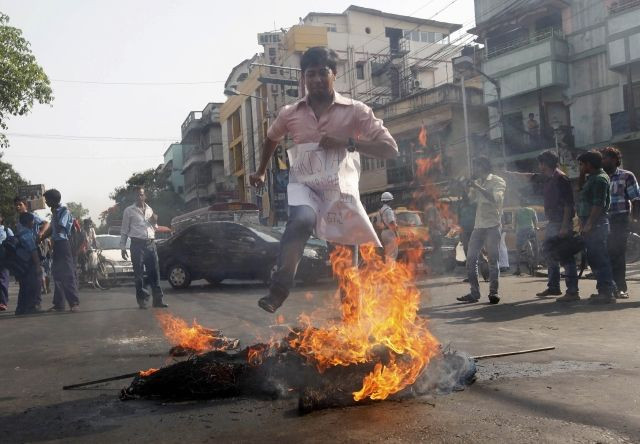Sarabjit Singh’s Death In Pakistan Sparks Fury And Grief In India; Pakistani Prisoner Attacked In India's Jammu Jail

Sarabjit Singh, an Indian man convicted of spying by a Pakistani court who died on Thursday following injuries inflicted in a brutal attack in a jail in Lahore, will be cremated with state honors in his home village near the city of Amritsar in northern India.
Meanwhile, a Pakistani prisoner in Kot Bhalwal jail on the outskirts of northern Indian state of Jammu was critically injured after he was attacked by a fellow prisoner, in what appears to be a retaliatory attack against Sarabjit Singh’s death.
The Pakistani prisoner was attacked by a former Indian Army soldier, the Press Trust of India (PTI) reported.
The prisoner, who was taken to the Government Medical College Hospital in Jammu, suffered serious head injuries and is reported to be in a coma, the PTI report added, citing doctors.
Sarabjit Singh, who was sentenced to death by a Pakistani court 22 years ago, on espionage charges for his role in bomb attacks that killed 14 people in Pakistan in 1990, was attacked with bricks by prisoners in Lahore's Kot Lakhpat jail last Friday.
The death of Sarabjit Singh sparked widespread fury and grief in India and deepened the distrust between India and Pakistan, dealing a heavy blow to bilateral ties among the historic rivals.
The two nuclear-armed neighbors have fought three wars since the partition of India in 1947. Despite an improvement in the relations due to a peace process that began in 2004, they have not been able to establish an atmosphere of mutual trust.
New Delhi had earlier appealed for Singh to be released or transferred to India over concerns about his treatment following his attack. Singh, 49, had been lying in a coma after he suffered multiple grievous injuries when six prisoners attacked him on April 26.
Singh, a resident of Bikhiwind village near Amritsar city in northern Indian state of Punjab, was arrested near the Kasur border in August 1990 on charges of illegally crossing into Pakistan from India. Police in Pakistan later charged him of being involved in a series of bombings in Lahore and Faisalabad that killed 14 people.
Earlier, Singh’s lawyer said his client had received threats after India executed in February Kashmiri Muslim Afzal Guru, who was sentenced to death more than eight years ago for his role in the attack on Indian Parliament in 2001.
Guru’s hanging followed that of Ajmal Kasab, a Pakistani who was the sole surviving perpetrator of the 2008 Mumbai attacks.
India’s opposition and Sarabjit Singh’s family slammed the government for going soft in dealing with Pakistan.
Gujarat Chief Minister Narendra Modi, touted as the prime ministerial candidate for key opposition Bharatiya Janata Party (BJP), wrote on Twitter: “Center is unable to give a strong answer to Pakistan's inhuman acts. Beheading of our soldiers and now Sarabjit's death are 2 recent examples.”
“Sarabjit's extra-judicial killing is yet another grim reminder that expecting Pakistan to follow due process of law in any sphere is futile,” he added.
Sarabjit Singh's sister Dalbir Kaur called her brother's death “a murder by Pakistan," according to the Associated Press news agency.
A section of the public reflected that the execution of Ajmal Kasab in India may have sparked Pakistan fury similar to news of Singh’s death in India.
In a letter to the Hindu newspaper, T.V. Vipin, a resident of the southern Indian state of Kerala, wrote: “We do not know whether he [Sarabjit Singh] actually committed the crime he was accused of. It might be a case of mistaken identity. But as far as Pakistanis are concerned, Sarabjit was to them what Ajmal Kasab was to us. He was a foreign national sentenced to death for carrying out terror activities in Pakistan — an ‘enemy of the state.’”
However, several other commentators took to nationalistic rhetoric and Pakistan-bashing: “Sarabjit’s death is a murder most foul. Pakistan was built on anti-India ideology. It keeps hatred and acrimony towards India alive to survive. The killing of our soldiers on the LoC is another instance of this hate. Sarabjit’s death should drive home the fact that no matter how soft and magnanimous we are towards Pakistan, it will always be antagonistic to us,” wrote Sireesha Sundar, a resident of southern state of Andhra Pradesh.
The death has also triggered protests in India, with people burning Pakistani flags and accusing the Pakistani government of hatching a plot to kill Singh.
© Copyright IBTimes 2024. All rights reserved.






















